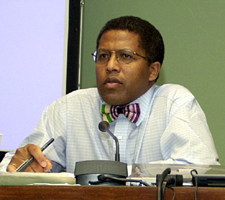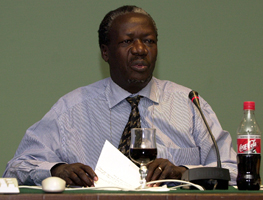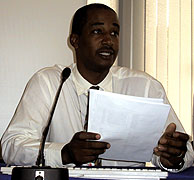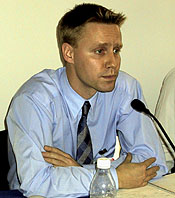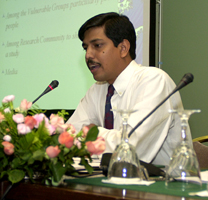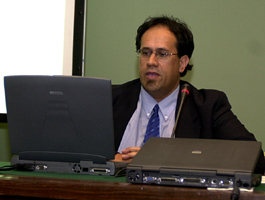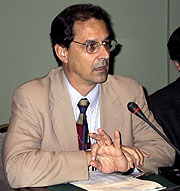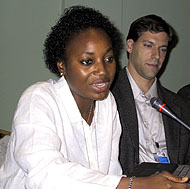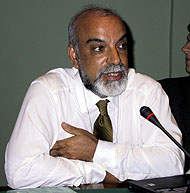|
|
|||||||||||||||||||||||||||||||||||||||||
|
|||||||||||||||||||||||||||||||||||||||||
|
Events convened on Tuesday, 30 October 2001 |
|
New
proposals from the Least Developed Countries (LDCs), including
National Adaptation Programmes of Action
Presented by the LDC Group
Paul Desanker, Malawi, emphasized LDCs' urgent and immediate need to begin adapting to the adverse impacts of climate change, given their low adaptive capacity. He highlighted the ability of adaptation activities to save lives, minimize economic losses, and reduce the vulnerability to food and water scarcity that may result from a future adverse climate as reasons for the immediate development and implementation of NAPAs. Desanker emphasized the need for NAPAs to be action-oriented and country-driven and to set clear priorities for urgent adaptation activities. NAPAs would contain a framework for the adaptation programme, identification of key adaptation activities, a list of potential projects, selection of priority activities, and project profiles. Priority activities would be selected based on their ability to minimize potential impacts of climate change on the economy, protect items of significant cultural value, and reduce potential damage to important infrastructure. Desanker stated that the process of developing NAPAs must employ a participatory approach, build on existing plans and programmes, incorporate gender equity, be country-driven, and embody sustainable development and environmental protection.
Philip
Gwage, Uganda, outlined the process of preparing a NAPA. He
explained that vulnerable sectors must be identified, necessary
interventions determined, priorities established, project profiles
developed, and comments sought at national, regional and international
levels. The process of implementing NAPAs includes identifying
institutions to implement projects, developing project documents
with clear monitoring and evaluation procedures, and preparing
final reports. He emphasized that priority actions to respond
to adverse effects will vary across countries, but highlighted
the common need for expertise in: climate change, including
assessment of vulnerability and adaptation; policy analysis;
public health; water resources management; coastal zone management;
agriculture; fisheries; infrastructure; and economics. He noted
that UNEP could play an active role in assisting LDCs with preparation
and implementation of NAPAs and could mobilize resources to
ensure that their preparation commences as quickly as possible. Discussion: Participants discussed the differences between NAPAs and national communications, noting that NAPAs can be more responsive to immediate adaptation needs, whereas national communications are more prescriptive and can include more long-term adaptation needs. Participants also highlighted: the need to identify the capacities necessary to adapt to key country-specific impacts; the relationship between the level of development and the ability to adapt; the importance of a bottom-up approach in formulating NAPAs; and coordination of NAPAs with national programmes.
|
|
Technology information Presented by the UNFCCC Secretariat At this event, participants discussed a technology information system being developed by the Secretariat to facilitate the flow of technology-related information to developing countries. Iulian Vladu, UNFCCC Secretariat, described a UNFCCC technology information project aimed at enhancing developing country access to information about state-of-the-art, environmentally sound technologies (ESTs), as specified under Article 4.5 of the Convention. The project developed a prototype website that will serve as a clearinghouse of information about ESTs, technology transfer projects, and organizations involved in technology transfer. The site also provides a forum for users to exchange information and post comments. Vladu noted that the website will be useful for Parties and the general public, as well as the Secretariat.
Alexandra Mallett, Natural Resources Canada, emphasized that the website is an important first step in facilitating technology transfer. Highlighting the importance of access to information, she lauded the wealth of information available on the site. She stressed the important role of the private sector, and underscored that technology transfer needs should be identified by the host country. Holger Liptow, Deutsche Gesellschaft für Technische Zusammenarbeit (GTZ), congratulated the Secretariat for its good work on this project, but noted that much work remains to be done. He stressed that the information clearinghouse provided on the website will only be successful if it is updated on a regular and continuous basis. He also stressed the importance of making the website easily assessable for first-time users. Peter Pembleton, United Nations Industrial Development Organization (UNIDO), highlighted that additional human and financial resources may be required for the development and maintenance of the information system. He also noted the need for decentralized access, since some developing countries have limited access to the Internet. He added that more work needs to be done in order to make the information useful to industry.
Please visit the UNFCCC's "On Demand" webcast page for RealVideo coverage of this event |
|
Mainstreaming adaptation: Stakeholder-led assessment in the Caribbean and the United Kingdom Presented by the University of Oxford's Environmental Change Institute in collaboration with Caribbean Planning for Adaptation to Global Climate Change (CPACC) and the UK Climate Impacts Programme Ulric Trotz, CPACC, explained that the CPACC's objective is to develop national climate adaptation plans in all Caribbean countries. He emphasized the importance of developing adaptation policies despite scientific uncertainty, and noted that CPACC's accomplishments include the launch of cross-sectoral consultations, the inclusion of climate change issues into the political agenda, and public awareness-raising.
George de Berdt Romilly, de Romilly & de Romilly Ltd., reviewed the development of national climate change adaptation policies in the twelve Caribbean States. The process involved the convening of initial national consultative workshops, resulting in the preparation of Issues Papers, which identified and prioritized national climate change adaptation concerns and issues. Public education and awareness programmes were followed by a second round of national stakeholder consultations, which led to the development of draft adaptation policies, and later to implementation plans. Crispin D'Auvergne, St. Lucia, introduced St. Lucia's climate change adaptation policy and strategy. Its principles include the fulfilment of international obligations, stakeholder involvement and capacity building, and its priority activities address coastal and marine resources, human settlements, tourism, and cross-cutting issues. The strategy has led the insurance sector to address climate change adaptation, and has contributed to progress in establishing a coastal zone management unit.
Chris Shearlock, Sustainability Northwest, stressed the importance of promoting climate change as a business issue and involving all relevant stakeholders in discussions. He identified tools for mitigating climate change impacts, including research, education and capacity building, and project initiation. Finally, he stated that communicating and presenting information in a professional manner is crucial when addressing the private sector. John Firth, Severn Trent Water Ltd., outlined his firm's activities in the area of climate change adaptation. He stressed that: while mitigation is essential, businesses also need to develop adaptation strategies; businesses must build "headroom" into their planning models and assumptions to account for climate change; and impact assessments and responsibilities for adaptation strategies should be developed through partnerships.
|
|
Practical implementation of coastal adaptation strategies
This event examined various coastal adaptation strategies and mechanisms for their implementation through Integrated Coastal Zone Management (ICZM) programmes. Olga Pilifosova, UNFCCC Secretariat, reviewed the status of negotiations regarding adaptation, highlighting specific references to ICZM in COP-6 decisions. She underscored relevant activities in the SBSTA and SBI agendas, focusing on vulnerability and adaptation assessments in non-Annex I national communications. Marilia Manjate, Mozambique, introduced ICZM in Mozambique. She highlighted the establishment of a sustainable development center for coastal zones and a national coastal zone programme, which reviews legal frameworks, promotes sustainable waste management, and provides alternative livelihoods for local communities. She stressed the need for finance and technical assistance to address coastal zone management.
Wayne King, representing Pacific Island States, reviewed adaptation strategies for Pacific small island States. He outlined initial adaptation activities, such as certificate training courses on vulnerability and adaptation, and specific adaptation options such as strengthening disaster warning systems. Kees Dorland, the Netherlands, stated that the Netherlands' Climate Change Studies Assistance Programme's primary objectives include enabling developing countries to implement their UNFCCC commitments, and helping them to formulate policies that incorporate climate change concerns. He highlighted the value of vulnerability and adaptation studies for national communications. Tom Bucx, the Netherlands, introduced three CZMC initiatives to support practical implementation of coastal adaptation strategies: a framework to identify feasible response strategies and measures; an ICZM evaluation process to assess potentialities and needs; and a "function analysis" to stimulate synergies between UNFCCC and CBD measures.
|
|
Biomass energy: Prospects for poverty reduction, the empowerment of women and the creation of sustainable livelihoods
Richard Hosier,
UNDP, described UNDP and World Bank experiences with Global Environment
Facility (GEF) biomass energy projects. He described five portfolio
clusters: bagasse utilization; biomass district heating; biomass
residues for electricity; methane from biomass wastes; and biomass
gasification for gas turbine combined cycle technology.
Abdelmourhit Lahbabi, ADS Maroc, discussed renewable energy opportunities in rural Morocco. He noted recent progress in access to energy, but stressed the need for a new approach that focuses on local capacity building, partnerships with the private sector, and coordination between stakeholders. He recommended the promotion of sustainable biomass energy programmes, rural energy service companies, adequate financial mechanisms for small-scale energy projects, and new partnerships between NGOs and the private and public sectors.
Daniel Kammen, University of California Renewable and Appropriate Energy Laboratory, noted that greenhouse gas emissions from developing countries are expected to exceed emissions from industrialized countries in 20 to 30 years, and that a radical shift in energy production from fossil fuels to low-carbon technologies is necessary to slow growth in emis-sions. He said developing countries already rely on biomass for 30 to 90 percent of their energy needs, but commercial applications are rare and small-scale traditional biomass burning is often inefficient. Kammen highlighted that efficient stoves and fuels can dramatically reduce emissions and household fuel costs; however, the lack of access to information, technology and credit prevents most biomass users from switching to cleaner, more efficient energy sources. He concluded that small- and medium- sized renewable energy projects are appropriate for dispersed poor rural populations because they: require less capital expenditure; are more easily deployed; are expandable with growing demand; require local-level learning and capacity building; use local resources sustainably; minimize environmental impacts; and increase local employment opportunities.
|
|
For
further RealVideo coverage of these and other side-events at COP-7,
please visit the UNFCCC's "On Demand" webcast page |
|
| The Earth Negotiations Bulletin (ENB) on the side is a special publication of the International Institute for Sustainable Development (IISD) in cooperation with the United Nations Framework Convention on Climate Change (UNFCCC) Secretariat. The Editor of ENB on the side is Kira Schmidt <kira@iisd.org>. This issue has been written by Fiona Koza <fiona@iisd.org>, Dagmar Lohan <dagmar@iisd.org>, and Kira Schmidt <kira@iisd.org>. The Digital Editors are Andrei Henry <andrei@iisd.org>, Leila Mead <leila@iisd.org> and Kenneth Tong <ken@iisd.org>. Funding for publication of ENB on the side at COP-7 is provided by the UNFCCC Secretariat. The opinions expressed in ENB on the side are those of the authors and do not necessarily reflect the views of IISD and funders. Excerpts from ENB on the side may be used in non-commercial publications only and only with appropriate academic citation. For permission to use this material in commercial publications, contact the Managing Editor at <kimo@iisd.org>. Electronic versions of these issues of ENB on the side from COP-7 can be found on the Linkages WWW server at http://enb.iisd.org/climate/cop7/enbots/. | |
|
|
| © 2001, IISD. All rights reserved. |
|



